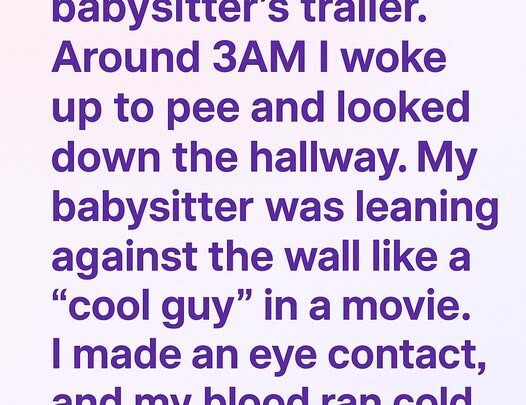Story
The Midnight Memory That Changed How I See People

When I was little, I often stayed at my babysitter’s trailer while my parents worked late. It was a small, cozy place that always smelled faintly of pancakes and laundry detergent. She was kind—one of those gentle people who always spoke softly and made every kid feel safe. But one night, something happened that stayed with me for the rest of my life.
It was around 3 a.m. when I woke up needing to use the bathroom. The house was quiet, and the kind of darkness that fills every corner made everything feel unfamiliar. As I stepped into the hallway, rubbing my sleepy eyes, I froze. My babysitter was standing there—leaning against the wall, arms crossed, like a “cool character” in one of those old movies. But something about it felt…wrong.
Her eyes were closed.
She wasn’t moving.
She wasn’t even breathing visibly.
For a few seconds, I thought maybe she was joking or trying to scare me. But as a child, I didn’t understand sleepwalking, and all I felt was raw fear. The way she stood there looked unnatural, too still, as if she were waiting for something invisible. I whispered her name once, then again, a little louder—but she didn’t respond. Her stillness filled the hallway like a shadow that didn’t belong there. My little heart pounded so hard I thought it would echo.
I tiptoed past her, keeping as much distance as possible, half-expecting her to suddenly open her eyes. The air felt heavy, and the silence pressed down on me. When I finally reached the bathroom, I locked the door and stood there for a while, listening—no footsteps, no movement, just quiet.
When I came out, she was still in the same spot. But now, she was whispering softly—murmuring words I couldn’t make out, like she was talking to someone who wasn’t there. The moonlight from a small window cut across her face, and for the first time, she didn’t look frightening. She looked…sad. Her expression wasn’t blank anymore—it was full of something deeper, like grief or worry. I didn’t understand it then, but something inside me felt sympathy instead of fear.
Quietly, I went back to the couch, pulled the blanket over my head, and waited for morning. I didn’t sleep much that night, listening to the creaks of the old trailer and wondering if she would come back to her room.
When the sunlight finally crept through the curtains, everything felt normal again. She was cheerful, humming as she made pancakes, just like always. For a long time, I hesitated to bring it up, but curiosity got the better of me. I asked, “Were you awake last night? I saw you standing in the hallway.”
She paused, flipping a pancake midair before catching it perfectly on the pan. Then she turned to me with a small, knowing smile. “Sometimes people carry their worries into their dreams,” she said. “But they don’t last forever.”
I nodded, pretending to understand. I didn’t ask any more questions.
Years later, as an adult, that memory came back to me unexpectedly one night while I was walking through my own house in the dark. I realized what I had seen wasn’t something eerie or supernatural—it was simply a person quietly fighting her own invisible battles. The exhaustion, the sadness, the strange stillness—it all made sense now. She had probably been overwhelmed, lost somewhere between waking and dreaming, her mind heavy with burdens she never talked about.
That night taught me something important—something I didn’t have the words for as a child. Sometimes, the things we fear most aren’t monsters or ghosts; they’re glimpses into someone else’s silent struggles. What looks unsettling or strange from the outside can often be a moment of deep pain or exhaustion that we don’t recognize until years later.
Now, whenever I remember that night, I don’t feel fear anymore. I feel compassion. That strange scene in the dim hallway wasn’t the beginning of a nightmare—it was the quiet confession of a tired heart. And it taught me that sometimes, the kindest thing we can do for others is to look beyond what frightens us, to understand that even in the most unsettling moments, what we’re really seeing might just be another person’s unspoken pain—and the courage it takes to carry it alone.
Disclaimer: All stories published on this website are for entertainment and storytelling purposes only. They do not have an identified author and are not claimed to be based on real events or people. Any resemblance to actual persons or events is purely coincidental.




